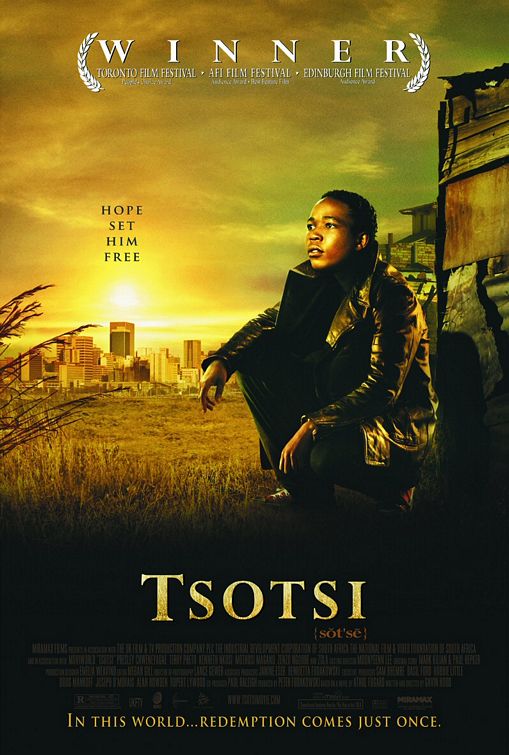"A Flawed But Striking Masterpiece"

| None | Light | Moderate | Heavy | |
|---|---|---|---|---|
| Language | ||||
| Violence | ||||
| Sex | ||||
| Nudity |
What You Need To Know:
Well-acted and psychologically complex, TSOTSI lures its audience into the slippery world of its protagonist and delivers an experience tainted with violence, but rich with forgiveness and redemption. With excessive foul language and explicit violence, TSOTSI is not an unblemished movie, but unlike so many movies, the perpetrators are forced to face conspicuous consequences, and some find redemption through brokenness and repentance. Ultimately, the movie is a flawed but striking masterpiece. Compassionate yet uncompromising, TSOTSI is a cogent movie that looks the human condition squarely in the eyes
Content:
(CC, B, Pa, LLL, VVV, N, AA, D, MM) Strong Christian worldview suggesting the depravity of human nature as well as powerful elements of compassion, forgiveness, repentance, and justice, with some pagan elements portrayed by several pleasure-seeking characters, although their actions are not without consequences; five profanities and 22 obscenities; several scenes of graphic violence, one depicting a man being stabbed in the stomach, one in which a man is kicked and brutally beaten, and another depicting a woman being shot in the stomach; no sex; a few scenes of brief, naturalistic nudity portraying a woman breastfeeding a baby; several scenes of alcohol use and drunkenness, plus one character struggles with alcoholism; light smoking; and, gambling and theft.
More Detail:
TSOTSI renders the moral journey of a murderous South African gang leader. Well-acted and psychologically complex, the movie lures its audience into the slippery world of its protagonist and delivers an experience tainted with violence, but rich with forgiveness and redemption. Compassionate yet uncompromising, TSOTSI is a cogent movie that looks the human condition squarely in the eyes.
Orphaned at an early age in the notoriously wanton outskirts of Johannesburg, South Africa, 19-year-old gang leader David (Presley Chweneyagae) has repressed any memory of his past, even his name. Known only as “Tsotsi,” which means “thug” in Soweto street slang, the angry hoodlum leads a life of crime and violence, and demonstrates no concern for anyone but himself, his gang notwithstanding. His cohorts include Boston (Mothusi Magano), an intellectually-minded alcoholic, Butcher (Zenzo Ngqobe), a cold-blooded killer, and the jolly but simple-minded Aap (Kenneth Nkosi).
One night, after a stabbing on a train, the gang convenes at a local shebeen (illicit liquor bar), where the drunken Boston appears tormented by his conscience. While questioning the “decency” of their savage robbery, Boston also prods into Tsotsi’s past, but the leader refuses to disclose anything, even his real name. Boston’s interrogation eventually incites him into a violent rage, and Tsotsi beats Boston senseless. Afterwards he flees the shebeen, and wanders to an affluent neighborhood where he encounters an opportunity for an easy carjacking. While racing away in woman’s BMW, he hears the cry of a three-month-old baby in the back of the car. Distressed by the infant’s cries, Tsotsi crashes the car into a road sign. As he prepares to walk back to his shantytown on foot, Tsotsi is moved to take the baby with him, and shoves it into a shopping bag.
While Tsotsi is careful not reveal to anyone that he has the child, he eventually finds help (rather forcibly) in the young mother Miriam (Terry Pheto), which he coerces to breastfeed the child at gunpoint. With the sake of the infant in mind, Miriam gradually takes on the role of mother to the baby, and becomes a mentor of sorts to Tsotsi in the process. Miriam exhibits an authentic love for both the baby and a kindness to Tsotsi to which he is unaccustomed. Her tenderness has a creeping and powerful effect on Tsotsi, and leads him to not only confront his wicked ways, but also his past.
TSOTSI is based on a novel by Athol Fugard, a well-known South African playwright, and screenwriter/director Gavin Hood proves to be a discerning steward of Fugard’s story of redemption. Fugard commented that Hood’s screenplay is the best adaptation of any of his works and that, despite the changes and departures from the original story, he believes the script is totally faithful to the novel’s spirit.
One of the major changes to the story included making the screen version of the Tsotsi character about ten years younger than the protagonist in the novel. Because of the terrible things that Tsotsi does, they believed the audience would be more willing to forgive a boy who was on the verge of becoming a man than they would someone older. Presley Chweneyagae’s affective performance validates this decision. While arousing both anger and pathos in alternating scenes, Chweneyagae’s shifty-eyed confusion is impressively passed on to the viewer, allowing the audience to intimately experience the conflicting emotions and moral transformation of its lead character.
TSOTSI tells its challenging story in a way that demands the emotional involvement of its viewers. The movie is often difficult to watch, driven by a chain of violent incidents, but it should be noted that the movie’s violence, while obviously intended to disturb its audience, is not glamorized or nearly as excessive as many recent movies. The violence is included to achieve a purpose, to portray the extent of how calloused Tsoti’s heart has become. Tsotsi’s ruthless behavior is depicted only for the sake of advancing the story, to accentuate his subtle yet dramatic evolution from a raging monster to a broken, contrite man.
As the headstrong mother Miriam, Terry Pheto also delivers an outstanding performance. Like Tsotsi, her character has also suffered some cruel circumstances. Without any explanation, Miriam’s husband left her and their baby to fend for themselves. Unlike Tsotsi, Miriam has overcome the poor hand life has dealt her with a determined and persistent love. She makes ends meet as a seamstress, and finds joy in her artistic endeavors, but is driven by the unconditional love for her child. Over time, Tsotsi begins to understand that Miriam’s inner peace comes from serving the interests and needs of others, rather than her own. She shelters Tsotsi’s foundling child, and selflessly cares for it as if it were her own. She has overcome evil with good, and the seeds of her humble Christlike service are being planted in Tsotsi’s heart. Tsotsi is attracted to her radiance, and she influences Tsotsi to do what is right, regardless of the consequences.
With excessive foul language, explicit violence and alcoholism, TSOTSI is not an unblemished movie, but unlike so many Hollywood movies, the perpetrators are forced to face conspicuous consequences, and some find redemption through brokenness and repentance. Ultimately, TSOTSI is a flawed but striking masterpiece, an engaging specimen of the human condition, the mounting effects of sin, and the redemption possible through repentance.



 - Content:
- Content: 



